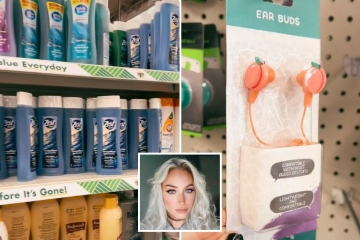
SIX in 10 American parents were raised thinking sex was “taboo,” new research suggests.
A recent OnePoll survey asked 2,000 parents of children ages five to 18 to examine their own views about sex, including how they’ve addressed the topic with their kids.
GettyNew research suggests six in 10 American parents were raised thinking sex was ‘taboo’[/caption]
Fifty-eight percent of respondents have already spoken to their children about sex, and 21 percent plan to do so in the future.
However, the same percentage (21 percent) don’t plan to bring up the “sex talk” at all.
Surprisingly, 58 percent of parents whose kids are 10 to 13 and 57 percent of parents of kids 5 to 9 have given them “birds and the bees” talk.
Half of the parents of children ages 4 and under also had those conversations with them (51 percent).
Read more lifestyle stories

STAIN RELIEF
I’m a professional cleaner – the stain removers I can’t go without from $2

DOLLAR TREE DUDS
I’m a Dollar Tree fan & I’d NEVER buy these items – not everyone agrees
Interestingly, men were more likely to discuss sex with their kids than women (61 percent vs. 56 percent).
Of the 42 percent of parents who haven’t talked to their kids about sex, 37 percent cited their child’s young age as the main reason.
Thirty-five percent reported that their kids are learning sex education in school, and 26 percent said the other parent is taking the lead.
One in four admitted they would feel awkward while having those conversations about sex with their children (26 percent).
Most read in The Sun
SIGHT TO BEHOLDEN
Amanda Holden looks incredible as she goes braless in 60s inspired dress
RUN AMOK
We can't drop off our kids at school safely after council BANNED cars from gates
top of the pops
Katie Price’s son Junior hits number 1 within hours of releasing debut song
through the keyhole
All the Love Island stars' houses from Luca's pad to Ekin-Su's mansion
KIDDING ME
I’m a full time mum & trolled for my ‘filthy’ house – I’m just doing my best
DADDY’S GIRL
I’m knackered but dad is here to hold me up, says Deb James in heartfelt post
Regardless of those feelings, seven in 10 of all parents agree the “birds and the bees” talk should happen at an early age, specifically because of how often kids are exposed to similar topics on social media and in other parts of daily life.
Dr Sara C. Flowers, vice president of education and training at Planned Parenthood Federation of America, encourages parents or caregivers to keep having ongoing conversations about sex rather than just having one “talk” to educate them.
“These conversations are not one-and-done – they should start early and keep happening as kids change and grow,” she told SWNS.
“For younger kids, this looks like knowing the correct names for all body parts. As kids grow up, they begin to understand what those body parts do.
“Sex education happens in building blocks, just like math. We start by learning the basics, like numbers and counting, and over time the conversations build up to more complex subjects like calculus.”
Respondents were also asked if their parents had educated them about sex when they were younger.
Nearly half said they received some form of the “sex talk”(47 percent), but another 30 percent never broached the subject.
Twenty-seven percent of respondents said their parents avoided talking to them about sex because they were too young.
Now, as parents themselves, respondents are trying to be more approachable to their kids.
Seven in 10 said they want their children to feel comfortable discussing anything with them, even if it’s about sex education.
“A great place to begin is creating a safer space for these conversations at home,” Flowers added.
Read More On The Sun

HUSH MONEY
WWE CEO ‘paid former employee lover $3M to stay quiet about secret affair’

KOSMETIC WORK
I’m a plastic surgeon – signs Khloe Kardashian had more work than she says
“The most important thing to remember is what you want your kid to get out of the conversation with you.
“For most parents and caregivers, we want our kids to feel comfortable coming to us with questions and feel confident that their questions will be met with support and honesty, not shame and judgment.”












